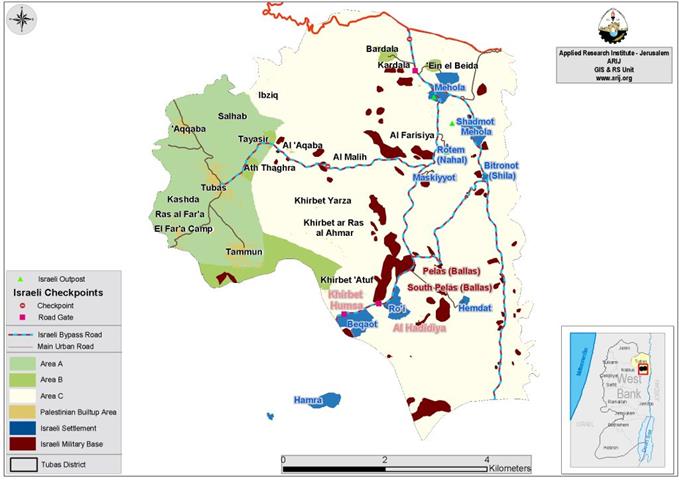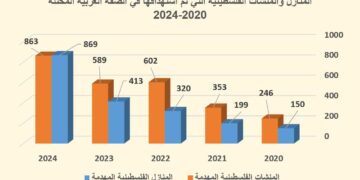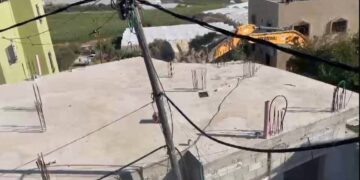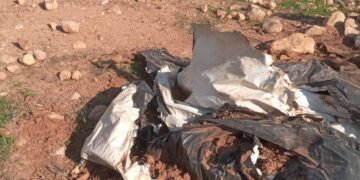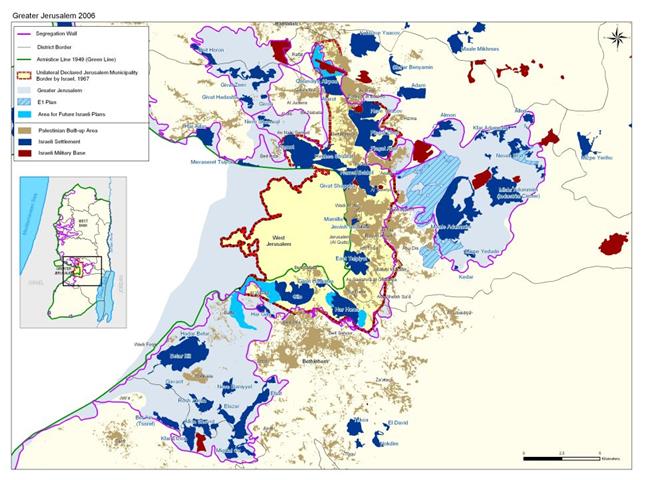On August 23, 2007, the Israeli Army bulldozers stormed two Palestinian communities north of the Jordan Valley and east of Tubas Governorate with a determination to eradicate them completely.
in Al Buqe’a plain east of Tubas Governorate the Israeli Army bulldozers started demolishing the Palestinian mobile homes of the local residents of Khirbet Humsa (pop.73 “PCBS 2006”), in the northern end of the Jordan Valley. The Israeli demolitions came nearly three months after the issuance of the military order warning to the local villagers of Khirbet Humsa to evacuate their homes in the area under the pretext of building in a closed military area.
in the nearby Palestinian village of Al Hadidiya (pop.183 “PCBS 2006”), the Israeli Army also issued a military order to evacuate the village claiming that the lands where the houses build in is a closed military area and its is forbidden to build their, so the local residents of Al Hadidiya must evacuate the area. The Israeli Army bulldozers came and started their mission there. See Map 1
Map of Humsa and Al Hadidiya
Methodic Israeli Harassment
Khirbet Humsa and Al Hadidiya village are small Palestinian communities located in Al Buqe’a plain east of Tubas Governorate, in the northern Jordan Valley. The areas where the two Palestinian communities exist were declared closed military area right after the Israeli Army occupied the West Bank territory in 1967. From that point on, the Israeli Army adopted an organized systematic policy to restrict access to the entire Jordan valley area, by which, the Israeli Army could control development of land and the built-up areas there. More than that, it formulated a set of access procedure to the entire area but was not strict to implement it, at least until few years back, when the plan of the Segregation Wall and the grabbing of Palestinian lands began to shape more clearly on the ground.
On the ground, the Israeli Army continued to terrorize the Palestinian residents living in the Jordan Valley area and control their movement either by confiscating their properties ,livestock, water tanks, without prior notification, they were also shot at and on their livestock as well, depriving them access to water supply by preventing any trucks to access the area and finally, the Israeli Army started an intensive campaign to demolish their mobile homes, barns and evicting them by force from their own lands and homes.
It is worth mentioning that Khirbet Humsa and Al Hadidiya villages are both surrounded by the Illegal Israeli settlements of Beqaot, Roi and Hemdat, in addition to many Israeli military bases, which adds to the Palestinian residents anguish and misfortune, because of the Israeli Army and the settlers’ daily and methodical harassments. See Table 1
|
Colony Name |
Location |
Date. Establishment |
Population |
Area-Dunums |
|
Mehola |
Tubas |
1968 |
362 |
1759 |
|
Beqaot |
Tubas |
1972 |
156 |
2284 |
|
Ro’i |
Tubas |
1976 |
117 |
1573 |
|
Shadmot Mehola |
Tubas |
1978 |
516 |
1291 |
|
Hemdat |
Tubas |
1980 |
140 |
317 |
|
Rotem (Nahal) |
Tubas |
1984 |
18 |
51 |
|
Masskeyyott |
Tubas |
1987 |
NA |
47 |
|
TOTAL |
***** |
***** |
1309 |
7322 |
Source: ARIJ Data Base 2007
Abstract
Under the International Law Rules and Conventions, Israel, as an occupying power, is prohibited from destroying or seizing the Palestinian lands and properties, unless such acts are justified by security needs and as long as they are carried out on temporary bases.
-
Article 53 of the Convention provides that: Any destruction by the Occupying Power of real or personal property belonging individually or collectively to private persons, or to the State, or to other public authorities, or to social or cooperative organizations, is prohibited, except where such destruction is rendered absolutely necessary by military operations.
-
Article 147 of the same Convention indicated that: Extensive destruction and appropriation of property not justified by military necessity and carried out unlawfully and wantonly, is a grave breach of the Convention.
-
Art. 23 of the Hague Convention of 1907 also provide: In addition to the prohibitions provided by special Conventions, it is especially forbidden to destroy or seize the enemy's property, unless such destruction or seizure be imperatively demanded by the necessities of war;
-
Also Article XXXI, Oslo II, 1995 provides: Neither side shall take any step that will change the status of the West Bank and the Gaza Strip.
Prepared by
The Applied Research Institute – Jerusalem
ARIJ


